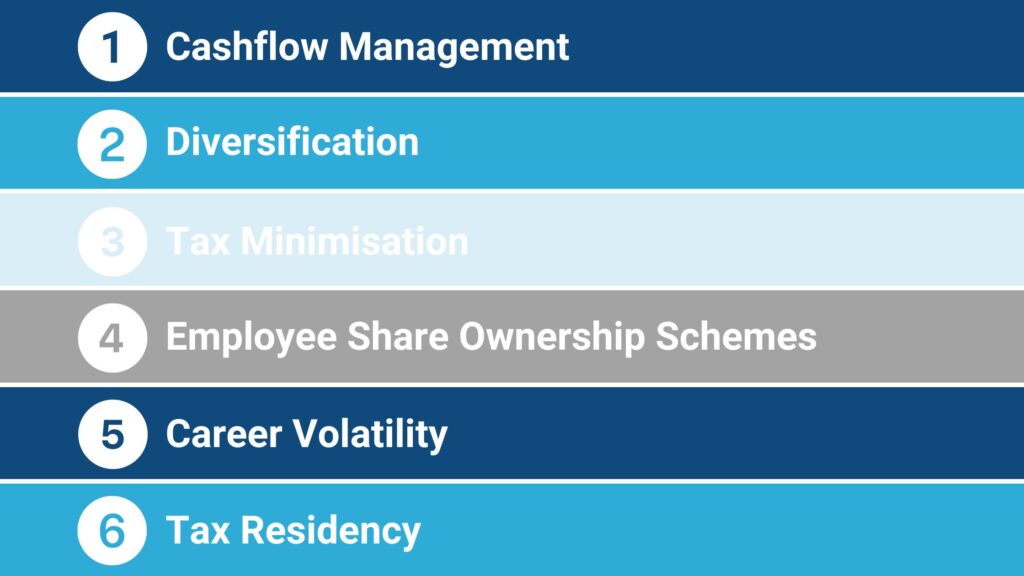In the penultimate article of our limited series on the unique financial landscape that is a career in information technology we explore one of the biggest financial considerations shared by this sector: Employee Share Ownership Schemes. If you’ve missed any of our previous articles, simply click on the relevant topic to view it: cashflow management, diversification, tax minimisation.
Top six issues when managing your money

Employee Share Ownership Schemes
An ESS, ESOP, and ESAP are all related to employee share ownership, but they have different meanings and implications. Here we take a look at each of them:
Employee Share Award Plan (ESAP)
An Employee Share Award Plan (ESAP) is a program where employees are awarded company shares or options. Under this scheme employees do not have to purchase the shares. Here they are provided to them as part of their remuneration and are typically based on factors such as a sign on bonus, performance, tenure, or a combination of all three.
Employee Share Option Plan (ESOP)
An Employee Share Option Plan (ESOP) is a program where employees are given the option (i.e., the right, but not the obligation) to purchase ordinary shares, before a certain date (‘vesting date’), and at a predetermined price (‘exercise price’). When an option vests, the employee must pay the exercise price or forfeit their option. The exercise price will reflect the fair market value of the shares at the date that the option was granted. Upon exercising their option, the employee will be issued their shares and assumes both voting rights and the right to receive dividends like any other shareholder.
Employee Share Scheme (ESS)
Perhaps the most common scheme in the IT industry is an Employee Share Scheme (ESS) which is a program where employees are given the opportunity to purchase shares in the company they work for, often at a discounted price.
The pros and cons of employee share ownership schemes: an example
Whilst there are numerous benefits to employee share ownership schemes (e.g. an increased sense of ownership and participation in business decision-making), it’s imperative to recognise the inherent risks of such schemes including a lack of diversification, share price fluctuations and complex tax legislation. That’s why it’s essential to seek advice from a tax accountant who is well versed in managing the unique financial challenges faced by tech professionals.
For example: a market-leading software organisation provides their team members with the opportunity to spend up to $20,000 of their annual salary on company shares at a heavily discounted price. This means each staff member purchases $5000 worth of discounted shares per quarter.
Whilst this may be a worthwhile investment, it may result in an unpleasant surprise at tax time. Why?
The tax bill
In many cases when employees purchase discounted shares there is no forethought given to the inevitable tax bill that will arise. This tax bill is a result of the PAYG that would have been paid if the $20,000 allocated towards shares was instead, paid as income. Here, forward planning (and saving) for the tax bill is key.
Timing the sale of shares
Another equally important consideration is timing any potential sale of these shares. Probability is, when you sell the shares, you have purchased at a heavily discounted price, you will sell them for a profit (assuming their market value does not dip below the heavily reduced price). Here, timing is key.
If you were to hold these shares for over 12 months, you should be eligible to receive a 50% CGT discount upon their sale. This means that 50% of the profit you made from the sale would constitute as CGT and the remaining 50% would be taxed at your nominal tax rate, leading to a sufficient tax saving versus selling them before the 12-month threshold. It’s worth noting that foreign residents are not eligible for the 50% CGT discount.
What are restricted stock units (RSUs)?
RSUs are offered by an organisation to employees as remuneration for their performance, tenure or a combination of both. Here the employee doesn’t own the RSU until the end of the vesting period (which can be any time period e.g. 3 years)
Upon vesting:
- The employee can choose to keep or sell the shares;
- The shares are valued at market price and classified as income;
- The shares need to be lodged as part of the employee’s income tax return and pay any tax required; therefore, it is beneficial to save for any potential tax bill.
Stay tuned!
Don’t miss the final article in this series where we dive into the topics of career volatility and tax residency, as well as take a look at how financial advice can help you do more with your money.
Follow our LinkedIn Page to keep up with the latest industry news, finance tips and more.






